Financial Reporting: Investment, Financing, and Dividend Decisions
VerifiedAdded on 2021/01/01
|7
|1415
|291
Report
AI Summary
This report delves into the core principles of financial reporting and management, emphasizing its crucial role in sustaining shareholder value. It begins by defining the purpose of financial management and then proceeds to critically evaluate key decisions from a stakeholder perspective, including investment, financing, and dividend choices. The report analyzes how these decisions affect a shareholder's financial position, considering factors like cash flow, investment criteria, cost of capital, and earnings. The analysis highlights the importance of effective wealth creation and return on investment for long-term success in the business market. The report underscores that the effective financial management and reporting are essential for businesses to secure investor confidence and maintain a competitive edge.

FINANCIAL REPORTING
Paraphrase This Document
Need a fresh take? Get an instant paraphrase of this document with our AI Paraphraser
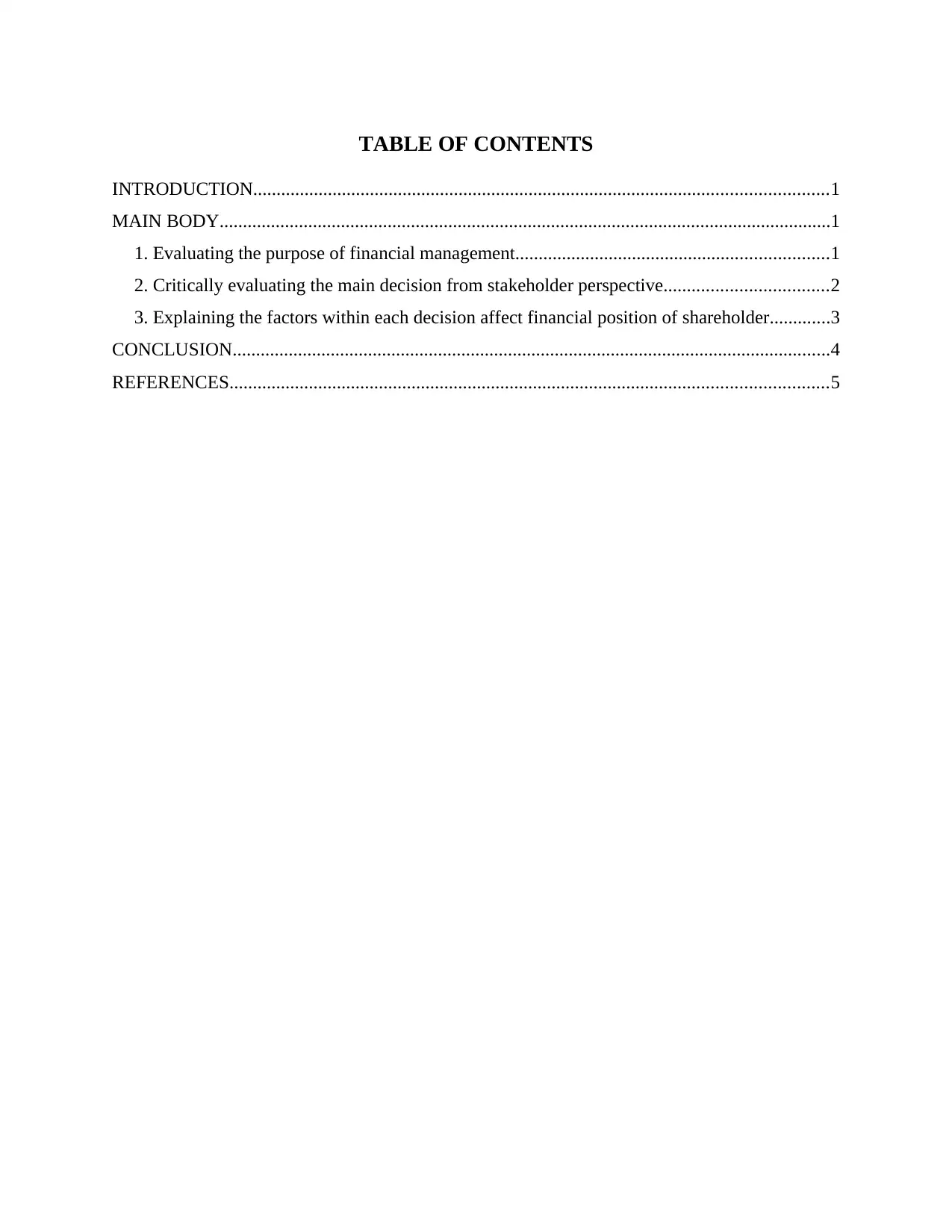
TABLE OF CONTENTS
INTRODUCTION...........................................................................................................................1
MAIN BODY...................................................................................................................................1
1. Evaluating the purpose of financial management...................................................................1
2. Critically evaluating the main decision from stakeholder perspective...................................2
3. Explaining the factors within each decision affect financial position of shareholder.............3
CONCLUSION................................................................................................................................4
REFERENCES................................................................................................................................5
INTRODUCTION...........................................................................................................................1
MAIN BODY...................................................................................................................................1
1. Evaluating the purpose of financial management...................................................................1
2. Critically evaluating the main decision from stakeholder perspective...................................2
3. Explaining the factors within each decision affect financial position of shareholder.............3
CONCLUSION................................................................................................................................4
REFERENCES................................................................................................................................5
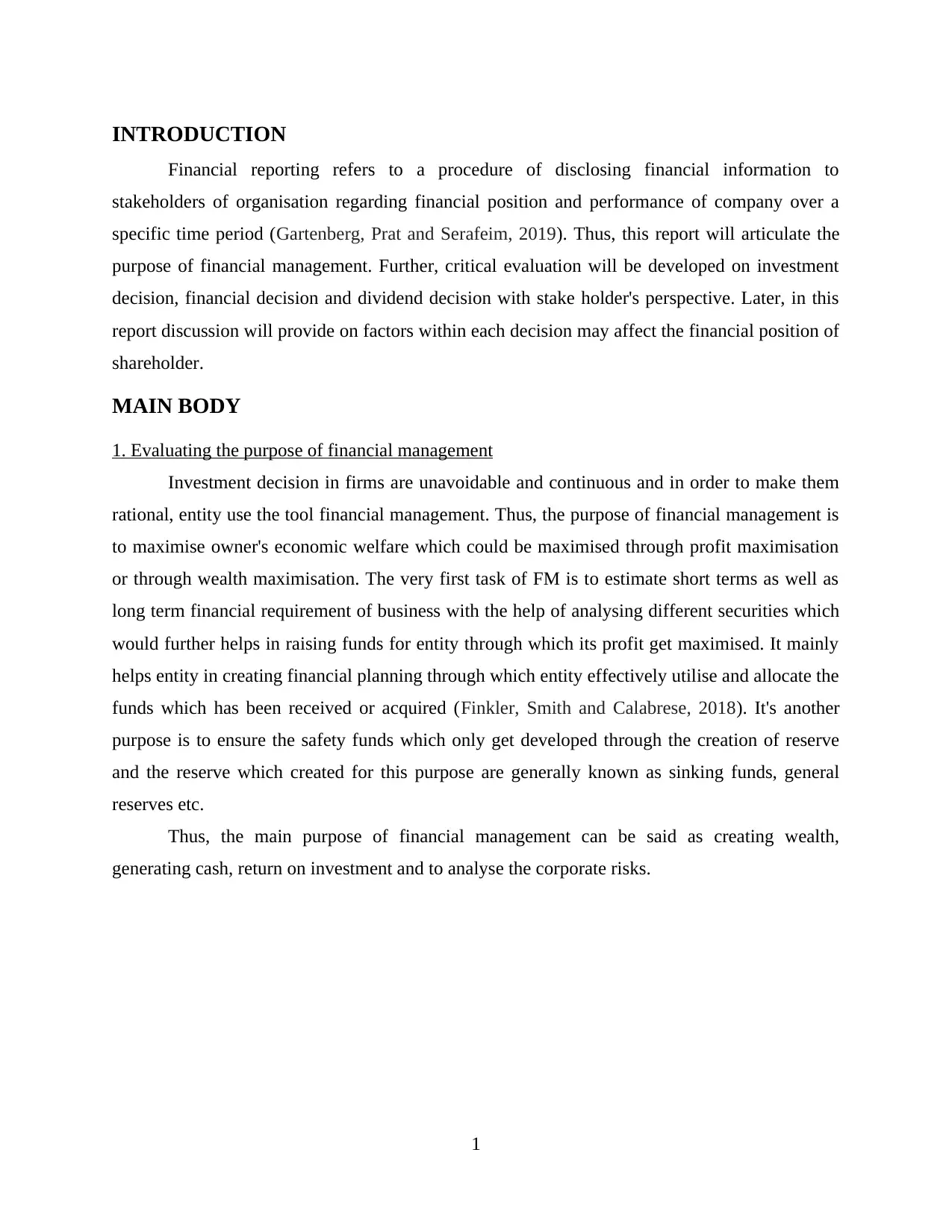
INTRODUCTION
Financial reporting refers to a procedure of disclosing financial information to
stakeholders of organisation regarding financial position and performance of company over a
specific time period (Gartenberg, Prat and Serafeim, 2019). Thus, this report will articulate the
purpose of financial management. Further, critical evaluation will be developed on investment
decision, financial decision and dividend decision with stake holder's perspective. Later, in this
report discussion will provide on factors within each decision may affect the financial position of
shareholder.
MAIN BODY
1. Evaluating the purpose of financial management
Investment decision in firms are unavoidable and continuous and in order to make them
rational, entity use the tool financial management. Thus, the purpose of financial management is
to maximise owner's economic welfare which could be maximised through profit maximisation
or through wealth maximisation. The very first task of FM is to estimate short terms as well as
long term financial requirement of business with the help of analysing different securities which
would further helps in raising funds for entity through which its profit get maximised. It mainly
helps entity in creating financial planning through which entity effectively utilise and allocate the
funds which has been received or acquired (Finkler, Smith and Calabrese, 2018). It's another
purpose is to ensure the safety funds which only get developed through the creation of reserve
and the reserve which created for this purpose are generally known as sinking funds, general
reserves etc.
Thus, the main purpose of financial management can be said as creating wealth,
generating cash, return on investment and to analyse the corporate risks.
1
Financial reporting refers to a procedure of disclosing financial information to
stakeholders of organisation regarding financial position and performance of company over a
specific time period (Gartenberg, Prat and Serafeim, 2019). Thus, this report will articulate the
purpose of financial management. Further, critical evaluation will be developed on investment
decision, financial decision and dividend decision with stake holder's perspective. Later, in this
report discussion will provide on factors within each decision may affect the financial position of
shareholder.
MAIN BODY
1. Evaluating the purpose of financial management
Investment decision in firms are unavoidable and continuous and in order to make them
rational, entity use the tool financial management. Thus, the purpose of financial management is
to maximise owner's economic welfare which could be maximised through profit maximisation
or through wealth maximisation. The very first task of FM is to estimate short terms as well as
long term financial requirement of business with the help of analysing different securities which
would further helps in raising funds for entity through which its profit get maximised. It mainly
helps entity in creating financial planning through which entity effectively utilise and allocate the
funds which has been received or acquired (Finkler, Smith and Calabrese, 2018). It's another
purpose is to ensure the safety funds which only get developed through the creation of reserve
and the reserve which created for this purpose are generally known as sinking funds, general
reserves etc.
Thus, the main purpose of financial management can be said as creating wealth,
generating cash, return on investment and to analyse the corporate risks.
1
⊘ This is a preview!⊘
Do you want full access?
Subscribe today to unlock all pages.

Trusted by 1+ million students worldwide
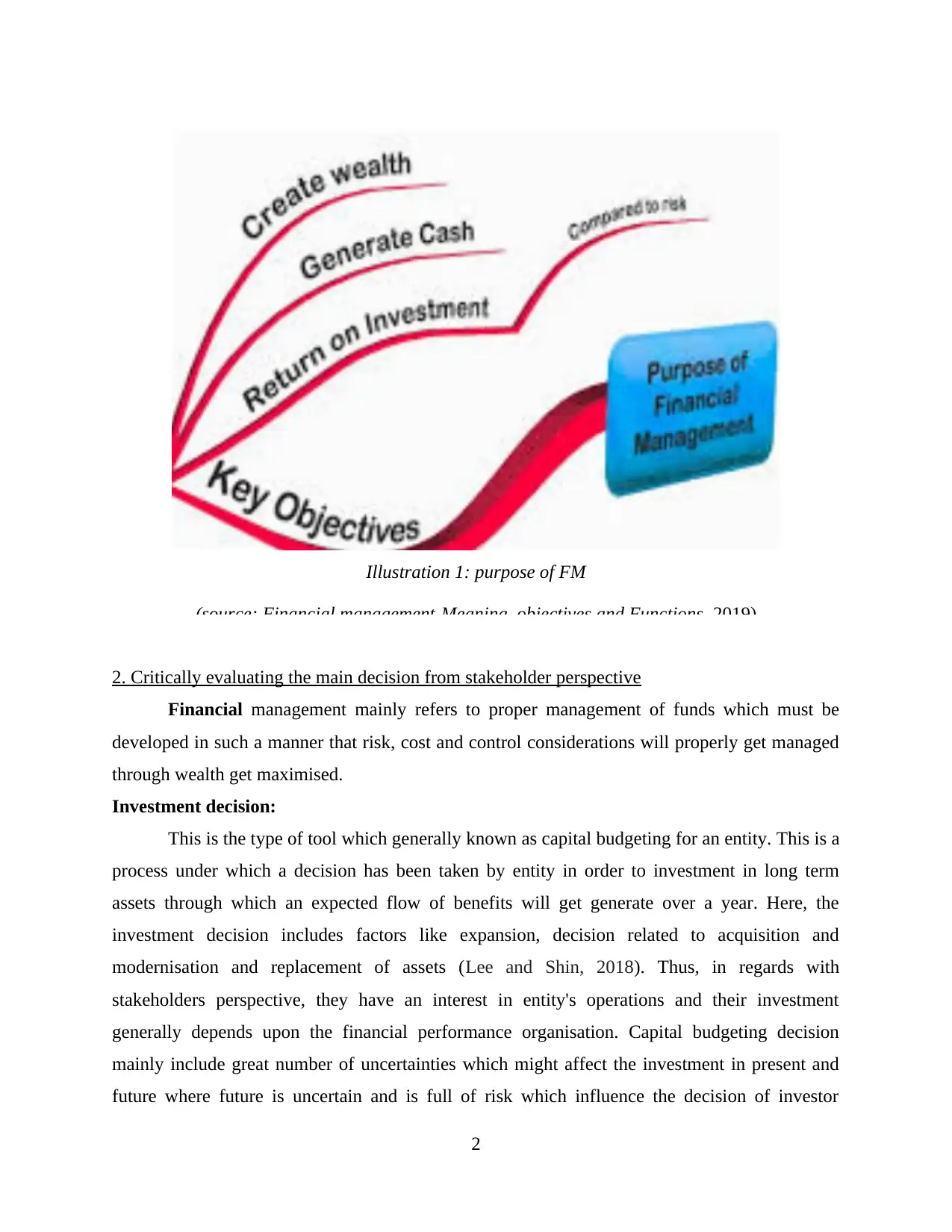
2. Critically evaluating the main decision from stakeholder perspective
Financial management mainly refers to proper management of funds which must be
developed in such a manner that risk, cost and control considerations will properly get managed
through wealth get maximised.
Investment decision:
This is the type of tool which generally known as capital budgeting for an entity. This is a
process under which a decision has been taken by entity in order to investment in long term
assets through which an expected flow of benefits will get generate over a year. Here, the
investment decision includes factors like expansion, decision related to acquisition and
modernisation and replacement of assets (Lee and Shin, 2018). Thus, in regards with
stakeholders perspective, they have an interest in entity's operations and their investment
generally depends upon the financial performance organisation. Capital budgeting decision
mainly include great number of uncertainties which might affect the investment in present and
future where future is uncertain and is full of risk which influence the decision of investor
2
Illustration 1: purpose of FM
(source: Financial management-Meaning, objectives and Functions, 2019)
Financial management mainly refers to proper management of funds which must be
developed in such a manner that risk, cost and control considerations will properly get managed
through wealth get maximised.
Investment decision:
This is the type of tool which generally known as capital budgeting for an entity. This is a
process under which a decision has been taken by entity in order to investment in long term
assets through which an expected flow of benefits will get generate over a year. Here, the
investment decision includes factors like expansion, decision related to acquisition and
modernisation and replacement of assets (Lee and Shin, 2018). Thus, in regards with
stakeholders perspective, they have an interest in entity's operations and their investment
generally depends upon the financial performance organisation. Capital budgeting decision
mainly include great number of uncertainties which might affect the investment in present and
future where future is uncertain and is full of risk which influence the decision of investor
2
Illustration 1: purpose of FM
(source: Financial management-Meaning, objectives and Functions, 2019)
Paraphrase This Document
Need a fresh take? Get an instant paraphrase of this document with our AI Paraphraser
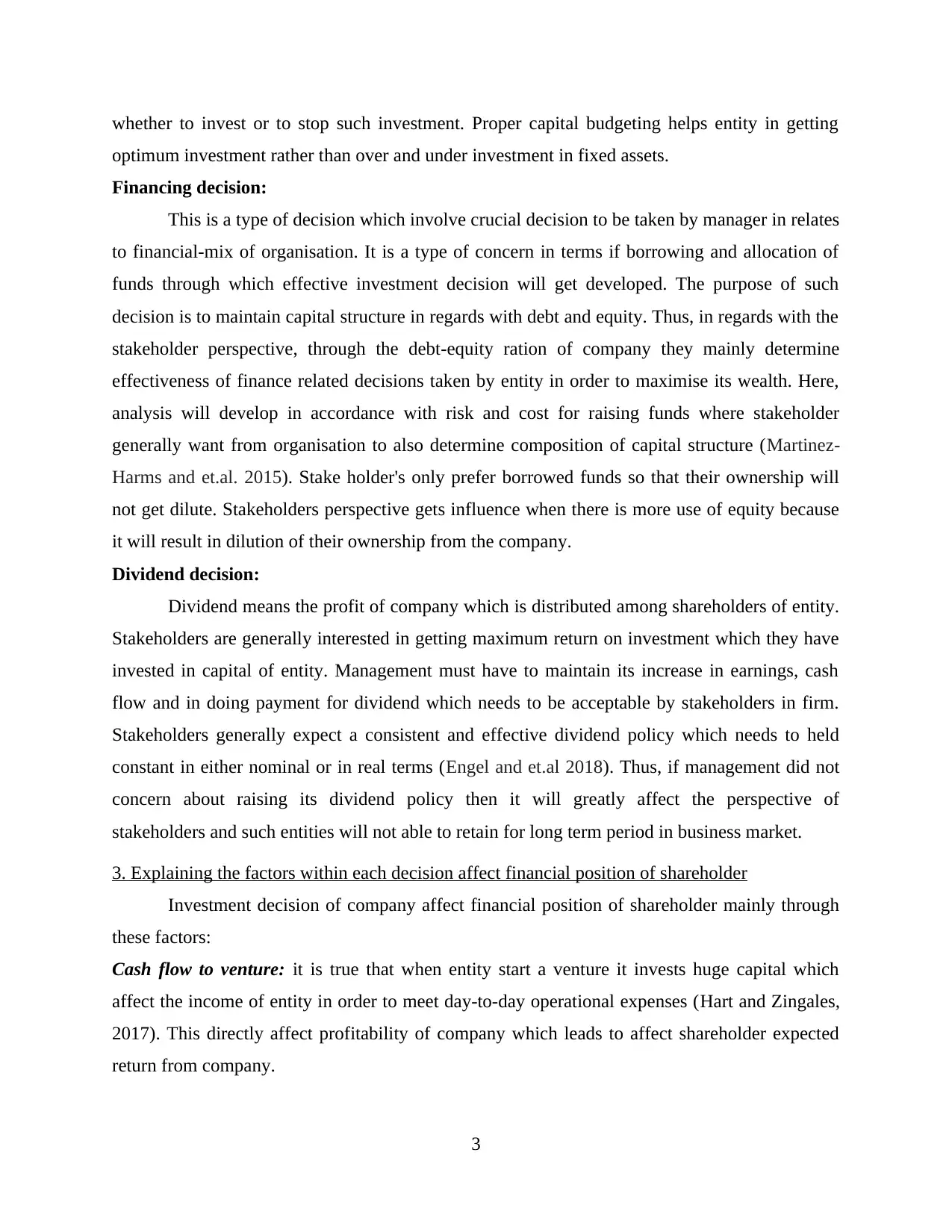
whether to invest or to stop such investment. Proper capital budgeting helps entity in getting
optimum investment rather than over and under investment in fixed assets.
Financing decision:
This is a type of decision which involve crucial decision to be taken by manager in relates
to financial-mix of organisation. It is a type of concern in terms if borrowing and allocation of
funds through which effective investment decision will get developed. The purpose of such
decision is to maintain capital structure in regards with debt and equity. Thus, in regards with the
stakeholder perspective, through the debt-equity ration of company they mainly determine
effectiveness of finance related decisions taken by entity in order to maximise its wealth. Here,
analysis will develop in accordance with risk and cost for raising funds where stakeholder
generally want from organisation to also determine composition of capital structure (Martinez-
Harms and et.al. 2015). Stake holder's only prefer borrowed funds so that their ownership will
not get dilute. Stakeholders perspective gets influence when there is more use of equity because
it will result in dilution of their ownership from the company.
Dividend decision:
Dividend means the profit of company which is distributed among shareholders of entity.
Stakeholders are generally interested in getting maximum return on investment which they have
invested in capital of entity. Management must have to maintain its increase in earnings, cash
flow and in doing payment for dividend which needs to be acceptable by stakeholders in firm.
Stakeholders generally expect a consistent and effective dividend policy which needs to held
constant in either nominal or in real terms (Engel and et.al 2018). Thus, if management did not
concern about raising its dividend policy then it will greatly affect the perspective of
stakeholders and such entities will not able to retain for long term period in business market.
3. Explaining the factors within each decision affect financial position of shareholder
Investment decision of company affect financial position of shareholder mainly through
these factors:
Cash flow to venture: it is true that when entity start a venture it invests huge capital which
affect the income of entity in order to meet day-to-day operational expenses (Hart and Zingales,
2017). This directly affect profitability of company which leads to affect shareholder expected
return from company.
3
optimum investment rather than over and under investment in fixed assets.
Financing decision:
This is a type of decision which involve crucial decision to be taken by manager in relates
to financial-mix of organisation. It is a type of concern in terms if borrowing and allocation of
funds through which effective investment decision will get developed. The purpose of such
decision is to maintain capital structure in regards with debt and equity. Thus, in regards with the
stakeholder perspective, through the debt-equity ration of company they mainly determine
effectiveness of finance related decisions taken by entity in order to maximise its wealth. Here,
analysis will develop in accordance with risk and cost for raising funds where stakeholder
generally want from organisation to also determine composition of capital structure (Martinez-
Harms and et.al. 2015). Stake holder's only prefer borrowed funds so that their ownership will
not get dilute. Stakeholders perspective gets influence when there is more use of equity because
it will result in dilution of their ownership from the company.
Dividend decision:
Dividend means the profit of company which is distributed among shareholders of entity.
Stakeholders are generally interested in getting maximum return on investment which they have
invested in capital of entity. Management must have to maintain its increase in earnings, cash
flow and in doing payment for dividend which needs to be acceptable by stakeholders in firm.
Stakeholders generally expect a consistent and effective dividend policy which needs to held
constant in either nominal or in real terms (Engel and et.al 2018). Thus, if management did not
concern about raising its dividend policy then it will greatly affect the perspective of
stakeholders and such entities will not able to retain for long term period in business market.
3. Explaining the factors within each decision affect financial position of shareholder
Investment decision of company affect financial position of shareholder mainly through
these factors:
Cash flow to venture: it is true that when entity start a venture it invests huge capital which
affect the income of entity in order to meet day-to-day operational expenses (Hart and Zingales,
2017). This directly affect profitability of company which leads to affect shareholder expected
return from company.
3
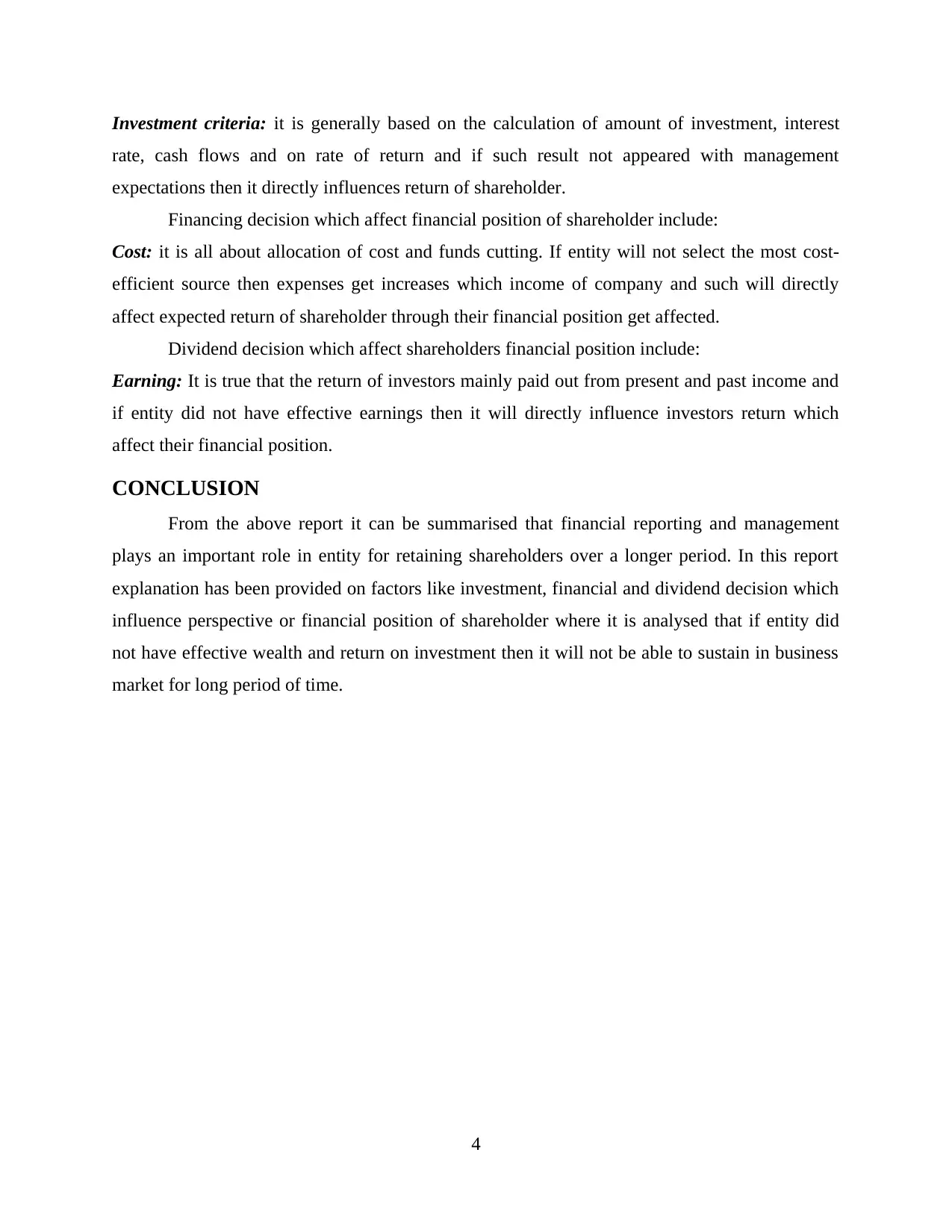
Investment criteria: it is generally based on the calculation of amount of investment, interest
rate, cash flows and on rate of return and if such result not appeared with management
expectations then it directly influences return of shareholder.
Financing decision which affect financial position of shareholder include:
Cost: it is all about allocation of cost and funds cutting. If entity will not select the most cost-
efficient source then expenses get increases which income of company and such will directly
affect expected return of shareholder through their financial position get affected.
Dividend decision which affect shareholders financial position include:
Earning: It is true that the return of investors mainly paid out from present and past income and
if entity did not have effective earnings then it will directly influence investors return which
affect their financial position.
CONCLUSION
From the above report it can be summarised that financial reporting and management
plays an important role in entity for retaining shareholders over a longer period. In this report
explanation has been provided on factors like investment, financial and dividend decision which
influence perspective or financial position of shareholder where it is analysed that if entity did
not have effective wealth and return on investment then it will not be able to sustain in business
market for long period of time.
4
rate, cash flows and on rate of return and if such result not appeared with management
expectations then it directly influences return of shareholder.
Financing decision which affect financial position of shareholder include:
Cost: it is all about allocation of cost and funds cutting. If entity will not select the most cost-
efficient source then expenses get increases which income of company and such will directly
affect expected return of shareholder through their financial position get affected.
Dividend decision which affect shareholders financial position include:
Earning: It is true that the return of investors mainly paid out from present and past income and
if entity did not have effective earnings then it will directly influence investors return which
affect their financial position.
CONCLUSION
From the above report it can be summarised that financial reporting and management
plays an important role in entity for retaining shareholders over a longer period. In this report
explanation has been provided on factors like investment, financial and dividend decision which
influence perspective or financial position of shareholder where it is analysed that if entity did
not have effective wealth and return on investment then it will not be able to sustain in business
market for long period of time.
4
⊘ This is a preview!⊘
Do you want full access?
Subscribe today to unlock all pages.

Trusted by 1+ million students worldwide
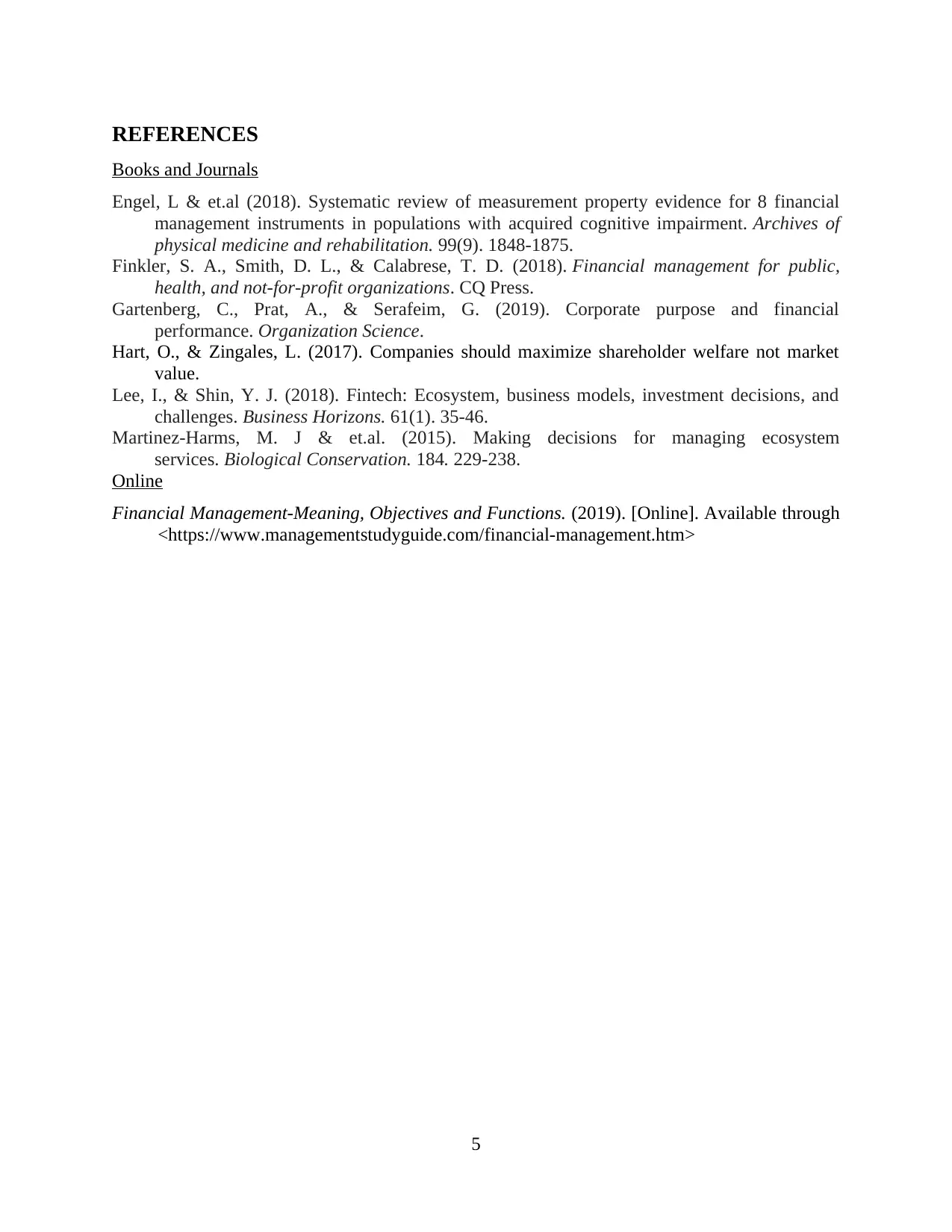
REFERENCES
Books and Journals
Engel, L & et.al (2018). Systematic review of measurement property evidence for 8 financial
management instruments in populations with acquired cognitive impairment. Archives of
physical medicine and rehabilitation. 99(9). 1848-1875.
Finkler, S. A., Smith, D. L., & Calabrese, T. D. (2018). Financial management for public,
health, and not-for-profit organizations. CQ Press.
Gartenberg, C., Prat, A., & Serafeim, G. (2019). Corporate purpose and financial
performance. Organization Science.
Hart, O., & Zingales, L. (2017). Companies should maximize shareholder welfare not market
value.
Lee, I., & Shin, Y. J. (2018). Fintech: Ecosystem, business models, investment decisions, and
challenges. Business Horizons. 61(1). 35-46.
Martinez-Harms, M. J & et.al. (2015). Making decisions for managing ecosystem
services. Biological Conservation. 184. 229-238.
Online
Financial Management-Meaning, Objectives and Functions. (2019). [Online]. Available through
<https://www.managementstudyguide.com/financial-management.htm>
5
Books and Journals
Engel, L & et.al (2018). Systematic review of measurement property evidence for 8 financial
management instruments in populations with acquired cognitive impairment. Archives of
physical medicine and rehabilitation. 99(9). 1848-1875.
Finkler, S. A., Smith, D. L., & Calabrese, T. D. (2018). Financial management for public,
health, and not-for-profit organizations. CQ Press.
Gartenberg, C., Prat, A., & Serafeim, G. (2019). Corporate purpose and financial
performance. Organization Science.
Hart, O., & Zingales, L. (2017). Companies should maximize shareholder welfare not market
value.
Lee, I., & Shin, Y. J. (2018). Fintech: Ecosystem, business models, investment decisions, and
challenges. Business Horizons. 61(1). 35-46.
Martinez-Harms, M. J & et.al. (2015). Making decisions for managing ecosystem
services. Biological Conservation. 184. 229-238.
Online
Financial Management-Meaning, Objectives and Functions. (2019). [Online]. Available through
<https://www.managementstudyguide.com/financial-management.htm>
5
1 out of 7
Related Documents
Your All-in-One AI-Powered Toolkit for Academic Success.
+13062052269
info@desklib.com
Available 24*7 on WhatsApp / Email
![[object Object]](/_next/static/media/star-bottom.7253800d.svg)
Unlock your academic potential
Copyright © 2020–2026 A2Z Services. All Rights Reserved. Developed and managed by ZUCOL.





